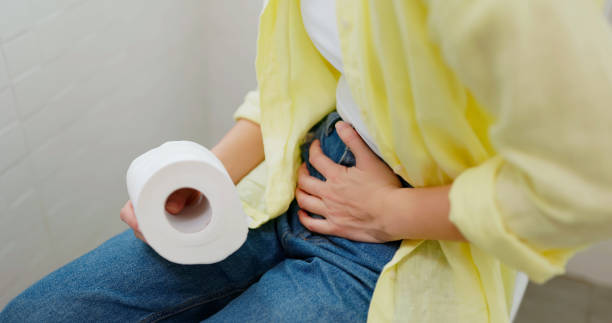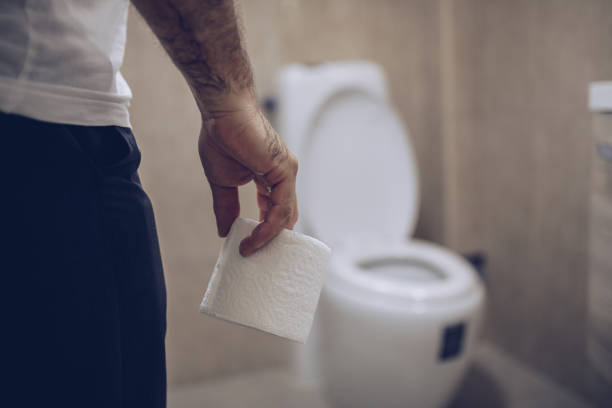Does Creatine Make You Poop? The Truth About Creatine and Diarrhea
Does Creatine Make You Poop? The Truth About Creatine and Diarrhea
Are you considering taking creatine but worried it might have you running to the bathroom? 🚽
Don't worry, we've got the scoop on whether creatine really causes diarrhea.
Buckle up and get ready for a wild ride through the world of creatine supplementation!

Why You Should Keep Reading: In this article, we'll dive deep into the nitty-gritty details of creatine and its potential effects on your digestive system. We'll separate fact from fiction and give you the lowdown on what to expect when you start chugging that creatine shake.
Plus, we'll throw in some humor and wit to keep things entertaining (because who doesn't love a good poop joke?). 🤣
What is Creatine and Why Do People Take It?
Before we get into the creatine-diarrhea connection, let's quickly cover what creatine is and why it's so popular in the fitness world.
Creatine is a naturally occurring compound found in muscle cells that helps supply energy for high-intensity exercises like weightlifting or sprinting. 💪
By supplementing with creatine, you can increase your muscle's stores of phosphocreatine, which acts as a reserve of high-energy phosphates to help you power through those grueling workouts.
The benefits of creatine supplementation include:
- Increased muscle mass and strength 🏋️♀️
- Improved high-intensity exercise performance 🔥
- Potential benefits for cognitive function and brain health 🧠
Sounds pretty awesome, right?
But we all know that nothing in life comes without a catch.
And for creatine, that catch might just be some unwanted side effects in the bathroom department. 🚽

Can Creatine Really Make You Poop? 💩
The million-dollar question: does creatine cause diarrhea? The short answer is... maybe. 🤷♂️
Here's the deal: some people do report experiencing diarrhea or other gastrointestinal issues when they start taking creatine.
However, the evidence is mixed, and it's not entirely clear how common or severe this side effect really is.
One potential reason why creatine might cause diarrhea is that it can draw water into your intestines, which can lead to loose stools or diarrhea. This is particularly true if you don't drink enough water while supplementing with creatine.
Another possible explanation is that creatine may cause digestive issues in some people due to individual differences in gut bacteria or sensitivity to the supplement.

How to Minimize the Risk of Creatine-Induced Diarrhea
If you're worried about creatine causing you to have a case of the runs, fear not!
There are some simple steps you can take to minimize the risk:
- Start with a lower dose: Instead of going full-throttle with a loading phase (where you take large amounts of creatine upfront), start with a lower dose of around 3-5 grams per day and gradually increase if needed. This can help your body adjust to the supplement.
- Drink plenty of water: Creatine can cause dehydration, which can exacerbate digestive issues. Make sure to drink plenty of water throughout the day, especially when taking creatine.
- Try different forms of creatine: Some people find that certain forms of creatine, like creatine ethyl ester or creatine hydrochloride, are easier on their digestive system than the more common creatine monohydrate.
- Take it with food: Consuming creatine with a meal may help reduce potential digestive discomfort.
- Listen to your body: If you experience persistent diarrhea or other severe gastrointestinal issues after starting creatine, it's probably best to discontinue use and consult with a healthcare professional.

Creatine and Digestive Health: What the Research Says
While anecdotal reports of creatine-induced diarrhea are common, the scientific evidence is a bit more mixed.
Here's what some of the research has to say:
- A study published in the Journal of the International Society of Sports Nutrition found that creatine supplementation did not cause significant gastrointestinal issues in healthy individuals.
- However, another study suggested that some individuals may be more prone to digestive issues from creatine due to differences in gut bacteria or sensitivity.
- The International Society of Sports Nutrition's position stand on creatine notes that while some users may experience diarrhea or other gastrointestinal issues, these side effects are typically mild and temporary.
So, while creatine doesn't seem to cause major digestive problems for most people, it's clear that individual responses can vary.

The Bottom Line: Should You Take the Risk?
At the end of the day, the decision to supplement with creatine is a personal one that depends on your goals, tolerance for potential side effects, and overall health status.
If you're generally healthy and don't have a history of digestive issues, creatine is likely safe to try, especially if you follow the tips we covered for minimizing the risk of diarrhea.
Just be sure to start with a lower dose and gradually increase if needed.
However, if you have a pre-existing gastrointestinal condition like inflammatory bowel disease (IBD) or irritable bowel syndrome (IBS), it's probably best to consult with your healthcare provider before adding creatine to your supplement regimen.
And remember, if you do experience persistent diarrhea or other severe side effects after starting creatine, don't be a hero – listen to your body and discontinue use if necessary.

Key Takeaways
To wrap things up, here are the key points to remember about creatine and its potential to make you poop:
- Creatine may cause diarrhea or other gastrointestinal issues in some people, but the evidence is mixed
- Potential reasons include water retention in the intestines or individual sensitivity to the supplement
- Start with a lower dose, drink plenty of water, and consider different forms of creatine to minimize the risk
- Listen to your body and discontinue use if you experience persistent or severe side effects
- For most healthy individuals, the benefits of creatine likely outweigh the potential for mild, temporary digestive discomfort
So, there you have it, folks! The truth about creatine and its potential to turn your bathroom into a war zone.
Just remember to stay hydrated, start slow, and always trust your gut (literally). Happy creatine-ing! 💪🚽

Creatine Supplementation and Digestive Health Frequently Asked Questions
Does creatine make you poop?
Creatine may potentially cause digestive issues like diarrhea in some users. The effect of creatine on digestion can vary from person to person.
Some creatine users may experience an upset stomach or other gastrointestinal distress after creatine supplementation.
However, evidence that creatine causes significant gastrointestinal issues is mixed.
What dose of creatine should I take?
The recommended creatine dose for most adults is around 5 grams per day.
However, it's advisable to start with a lower dose, such as 3 grams, and gradually increase if needed.
High doses of creatine are generally not necessary and may increase the risk of side effects.
Can creatine cause dehydration?
Yes, creatine draws water into your muscle cells, which can potentially lead to dehydration if you don't compensate by increasing your water intake.
Make sure to drink enough fluids when taking creatine supplements to avoid dehydration.
What are the potential side effects of creatine?
The most common side effects associated with creatine include gastrointestinal issues like diarrhea or an upset stomach, muscle cramps, and weight gain due to water retention.
However, many studies suggest that creatine is generally safe and well-tolerated when used appropriately.
Can I take creatine supplements without experiencing side effects?
While creatine is generally well-tolerated, some individuals may be more prone to experiencing side effects related to creatine, such as digestive issues or muscle cramps.
Starting with a lower dose, staying hydrated, and using high-quality creatine supplements can help minimize the risk of side effects.
How does creatine affect athletic performance?
Creatine is a popular sports supplement because it can help increase muscle mass, strength, and high-intensity exercise performance.
The safety and efficacy of creatine supplementation for enhancing athletic performance have been extensively studied and supported by research.
Is creatine monohydrate a good form of creatine?
Creatine monohydrate is one of the most widely used and researched forms of creatine.
It's generally considered safe and effective for increasing muscle creatine stores and improving exercise performance.
Can creatine cause muscle cramps?
While muscle cramps are a potential side effect of taking creatine, the evidence is mixed.
Some studies suggest that creatine may actually help prevent or reduce muscle cramps, while others have found no significant effect.
How does creatine supplementation affect digestion?
Creatine supplementation may cause digestive discomfort and lead to side effects like diarrhea or an upset stomach in some individuals.
However, the extent to which creatine and digestion are related can vary based on factors like dosage, hydration levels, and individual sensitivity.

A Personal Trainer's Perspective
Creatine Make You Poop? Dosage and Side Effects Uncovered
As a personal trainer, I've seen my fair share of clients eager to try out the latest supplements promising gains and performance boosts.
One supplement that's been around for a while and never seems to go out of style? Creatine.
But let's be real, the question on everyone's mind is: does creatine make you poop? 💩
Fear not, my fitness fanatics! I've got the inside scoop on creatine side effects, and trust me, I've been there, done that, and loaded the creatine.
So, let's dive into the world of creatine supplementation and find out what's really going on with your bowel movements.

Creatine Cause Digestive Issues? The Hard Truth
Look, creatine use is generally safe and effective for boosting muscle growth and athletic performance. But let's not beat around the bush – some people do experience gastrointestinal issues like diarrhea when they start taking creatine.
In fact, it's a common side effect of creatine, especially if you're not drinking enough water or taking too much creatine at once.
Now, before you swear off creatine altogether, let me share a personal anecdote. When I first started using creatine, I made the rookie mistake of loading up on a high dose without properly hydrating.
Let's just say my trips to the bathroom became more frequent and, well, explosive. 💥 It was like my body was protesting the sudden influx of creatine.
But fear not, my friends! With a little bit of knowledge and some simple adjustments, you can minimize the risk of creatine-induced diarrhea and enjoy those sweet, sweet gains without having to avoid creatine altogether.

The Dose of Creatine That Won't Leave You Floored
One of the biggest culprits behind creatine-related digestive issues is taking too much creatine at once. The society of sports nutrition position stand recommends a daily dose of around 3-5 grams for most adults.
Personally, I've found that starting with a lower dose, like 3 grams, and gradually increasing if needed, works best for minimizing side effects.
Remember, creatine is an amino acid, and your body can only absorb so much at a time. Overloading your system with a high dose of creatine right off the bat is just asking for trouble (and potentially spending more time on the porcelain throne than in the gym).

Hydrate, Hydrate, Hydrate: The Key to Creatine Without Diarrhea
Okay, let's get real here – one of the main reasons creatine may cause gastrointestinal issues is dehydration.
Creatine draws water into your muscle cells, which can lead to dehydration if you're not drinking enough fluids.
And dehydration?
Well, that's a surefire recipe for digestive discomfort and potentially reduced blood volume (which ain't good for those sick pumps, bro).
So, if you're looking to take creatine without experiencing the dreaded side effect of diarrhea, make sure to drink enough water throughout the day.
I'm talking about chugging that H2O like it's going out of style. Seriously, keep a water bottle by your side at all times, and sip on it like your life depends on it (because, let's be real, your gains kind of do).
![]()
Creatine Monohydrate: The OG Supplement That Might Cause Cramps
Now, let's talk about the OG of creatine supplements: creatine monohydrate.
This bad boy has been around for ages and is generally considered safe and effective for increasing muscle creatine stores and boosting athletic performance.
However, some studies suggest that creatine monohydrate may also cause muscle cramps in some users.
Personally, I've experienced a few cramps here and there when using creatine, but nothing too debilitating.
If you're prone to muscle cramps or want to minimize the risk, you could try different forms of creatine, like creatine hydrochloride or creatine ethyl ester.
These alternative forms have been suggested to be potentially easier on the digestive system and less likely to cause cramping, but more research is needed to confirm their efficacy.

Potential Side Effects: When to Call It Quits
While creatine is generally considered safe, it's essential to be aware of the potential side effects and know when to stop taking it.
If you experience persistent or severe gastrointestinal issues, like chronic diarrhea or an upset stomach, despite adjusting your dosage and staying hydrated, it might be time to call it quits and stop taking creatine.
Other side effects to watch out for include muscle cramps, weight gain due to water retention, and potential negative side effects like dehydration or kidney issues (though these are rare, especially when taking the recommended creatine dose).
Remember, everyone's body is different, and what works for one person might not work for another.
If you're experiencing any concerning side effects related to creatine, it's always best to consult with a healthcare professional or consider switching to a different supplement.

The Bottom Line: Creatine and Digestion – A Love Story (Sometimes)
Look, creatine and digestion don't always play nice, but that doesn't mean you have to avoid creatine altogether.
By following a few simple tips, like starting with a lower dose, staying hydrated, and listening to your body, you can minimize the risk of diarrhea and other gastrointestinal issues.
And let's be real, a little bit of digestive discomfort is a small price to pay for those sweet, sweet gains, right?
Just make sure you've got a steady supply of toilet paper on hand, and you'll be good to go!
References
- Kreider, Richard B., et al. "International Society of Sports Nutrition Position Stand: Safety and Efficacy of Creatine Supplementation in Exercise, Sport, and Medicine." Journal of the International Society of Sports Nutrition, vol. 14, 2017, pp. 1-18. BioMed Central, https://jissn.biomedcentral.com/articles/10.1186/s12970-017-0173-z.
- Antonio, Jose, et al. "Common Questions and Misconceptions about Creatine Supplementation: What Does the Scientific Evidence Really Show?" Journal of the International Society of Sports Nutrition, vol. 18, 2021, pp. 1-10. BioMed Central, https://jissn.biomedcentral.com/articles/10.1186/s12970-017-0173-z.
- Rawson, Eric S., et al. "Creatine Supplementation for Health and Clinical Diseases: A Critical Review." Nutrients, vol. 9, no. 6, 2017, pp. 641-659. MDPI, https://www.mdpi.com/2072-6643/9/6/641.
- Kerksick, Chad M., et al. "Creatine and Other Supplements for Athletes: What Do We Really Know?" Nutrients, vol. 13, no. 4, 2021, pp. 1158-1178. MDPI, https://www.mdpi.com/2072-6643/13/4/1158.
- Dworatzek, Emily, et al. "Safety of Creatine Supplementation in Active Adolescents and Youth: A Brief Review." Frontiers in Nutrition, vol. 5, 2018, pp. 1-8. Frontiers Media, https://www.frontiersin.org/articles/10.3389/fnut.2018.00031/full.
For More Training Advice + Diet and Lifestyle visit us Combat Creatine
PS: Make sure you check out the rest of our Training Guides:
Creatine
Creatine Supplements Ultimate Guide
Creatine Supplementation Side Effects
Best Creatine Monohydrate Gummies Review: Top 10 Best Creatine Gummies











